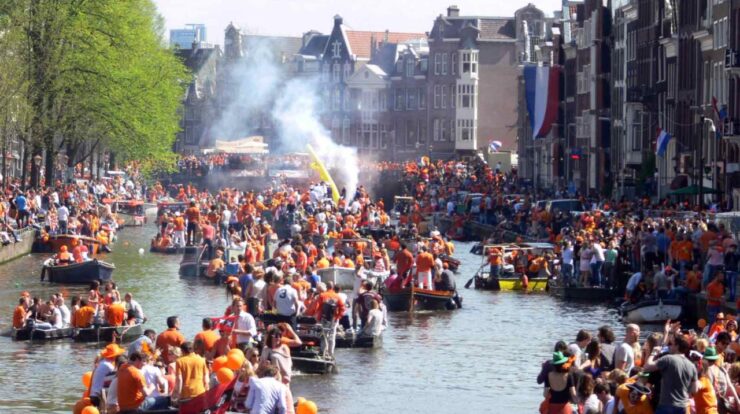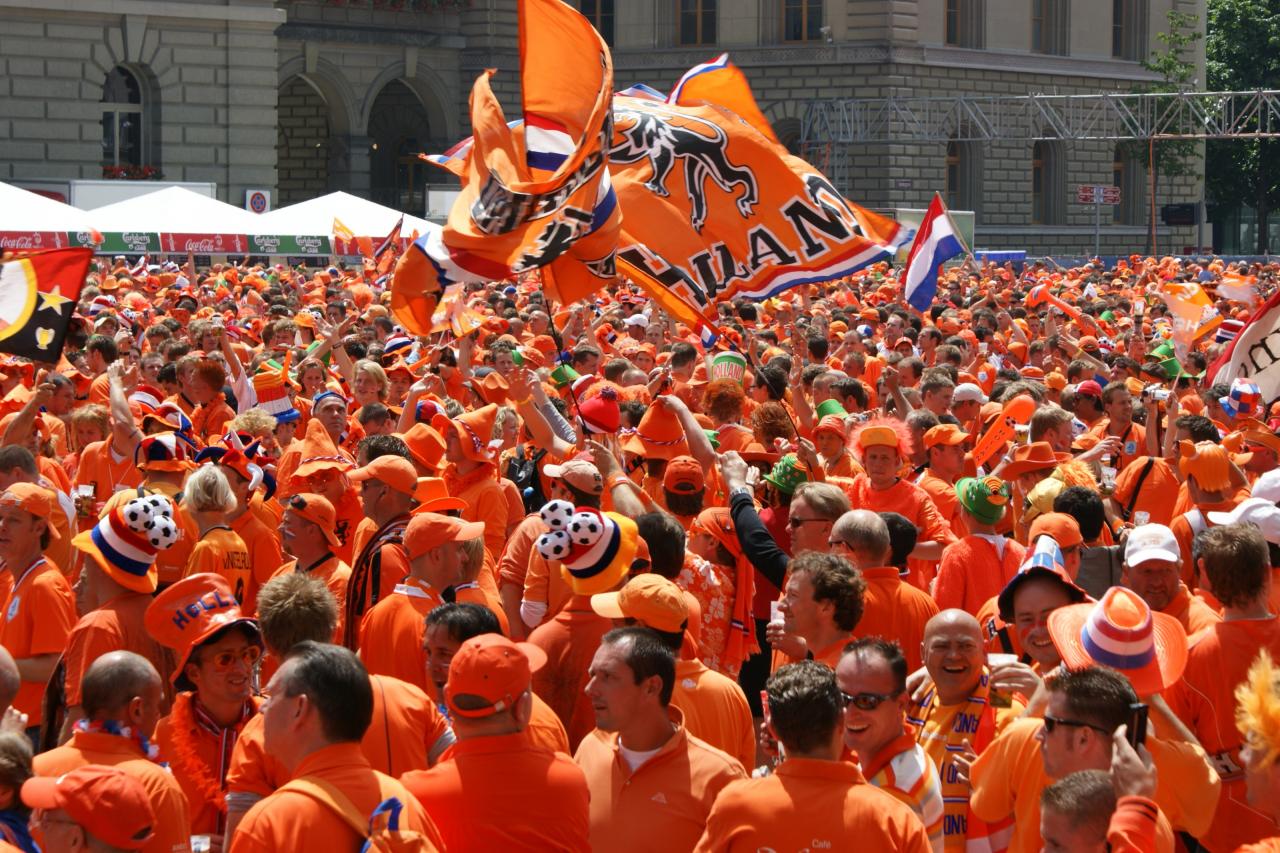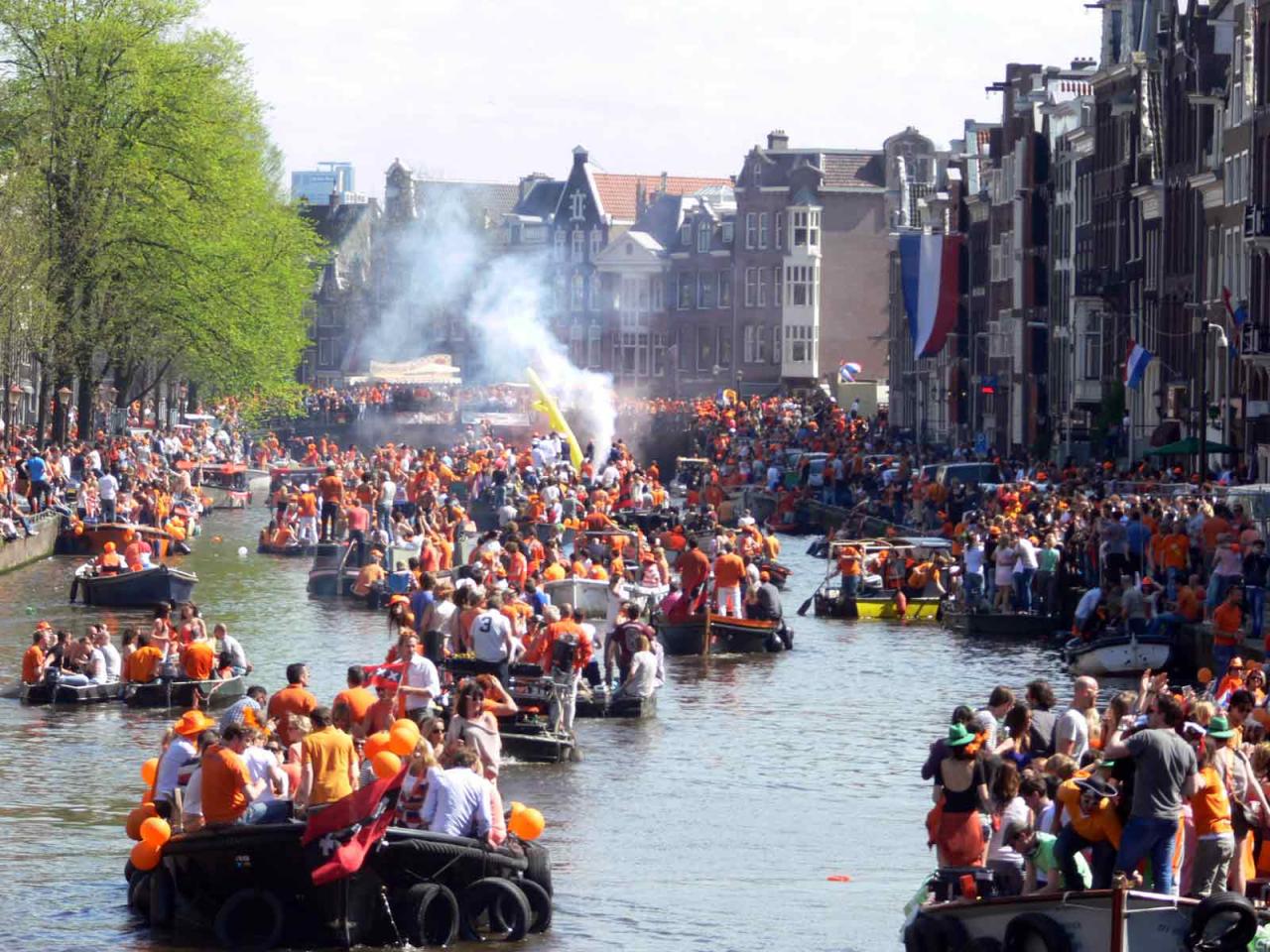
Kingsday, an annual celebration steeped in Dutch heritage and cultural significance, takes center stage as we delve into its historical roots, vibrant customs, and captivating evolution. From its origins to its contemporary manifestations, this festival paints a vibrant canvas of tradition, revelry, and global impact.
This immersive exploration of Kingsday unravels the symbolism behind the ubiquitous orange attire and flags, uncovers the role of music and dance in the festivities, and traces the festival’s transformation over time. We delve into its economic and tourism impact, showcasing how it invigorates local businesses and promotes Dutch culture on a global scale.
Historical Origins and Significance: Kingsday

Kingsday has its roots in the 19th century, when it was known as Queen’s Day and celebrated the birthday of Queen Wilhelmina. After Queen Juliana ascended to the throne in 1948, the day was renamed Kingsday to honor her daughter, Princess Beatrix.
It became a national holiday in 1949 and has been celebrated annually ever since.
Cultural Customs and Celebrations
Kingsday is a day of national celebration in the Netherlands, marked by vibrant orange attire, flags, and music. The color orange represents the Dutch royal family, and many people wear orange clothing and accessories to show their support for the monarchy.
- Flea markets:The day is known for its widespread flea markets, where people sell their used goods and find bargains.
- Music and dance:Live music and dance performances fill the streets, creating a festive atmosphere.
- Street parties:Many cities and towns host street parties, where people gather to socialize, enjoy music, and celebrate the day.
Contemporary Celebrations and Evolution
In recent years, Kingsday celebrations have evolved to reflect modern culture and trends. Social media has become an integral part of the festivities, with people sharing photos and videos of their experiences.
- Digital events:Virtual events and online activities have become popular, allowing people to participate in the celebrations from anywhere.
- Sustainable practices:There has been a growing emphasis on sustainability during Kingsday, with many cities implementing measures to reduce waste and promote eco-friendly practices.
Economic and Tourism Impact
Kingsday has a significant economic impact on the Netherlands. The festivities boost tourism, with an estimated 1 million visitors coming to the country during the celebration. Local businesses also benefit from the increased foot traffic and sales.
- Tourism revenue:Kingsday is one of the most popular tourist events in the Netherlands, generating millions of euros in revenue.
- Local business boost:Many businesses experience a surge in sales during Kingsday, particularly those selling food, drinks, and souvenirs.
Cultural Diversity and Inclusion
Kingsday is a reflection of the cultural diversity of the Netherlands. People from all backgrounds participate in the festivities, and there are efforts to ensure inclusivity and representation.
- Multicultural participation:People from various cultures and ethnicities participate in Kingsday, contributing to its vibrant and diverse atmosphere.
- Inclusive events:Many cities and towns host events specifically designed to be inclusive and welcoming to all.
Sustainability and Environmental Considerations

Kingsday celebrations can have an environmental impact due to the large crowds and consumption of resources. However, there are ongoing efforts to minimize waste and promote sustainability.
- Waste reduction:Many cities have implemented measures to reduce waste, such as providing recycling bins and encouraging the use of reusable materials.
- Eco-friendly transportation:Public transportation is encouraged during Kingsday to reduce traffic congestion and emissions.
Global Recognition and Influence
Kingsday has gained international recognition and has influenced other cultures and celebrations. The vibrant orange attire and festive atmosphere have become synonymous with the Netherlands.
- International celebrations:Kingsday is celebrated in other countries with Dutch communities, such as Canada and Australia.
- Cultural exchange:Kingsday traditions have been adopted and adapted in other cultures, contributing to the global exchange of ideas and customs.
Conclusive Thoughts
As a testament to its enduring legacy, Kingsday has transcended borders, inspiring similar celebrations worldwide. Its emphasis on inclusivity and cultural diversity serves as a beacon of unity, fostering a sense of belonging among participants from all walks of life.
Furthermore, the festival’s commitment to sustainability underscores its relevance in an era of environmental consciousness.
General Inquiries
When is Kingsday celebrated?
Kingsday is celebrated annually on April 27th, the birthday of King Willem-Alexander.
What is the significance of the orange color associated with Kingsday?
Orange is the color of the Dutch royal family, the House of Orange-Nassau, and is a symbol of national pride and unity during Kingsday celebrations.
Is Kingsday a public holiday in the Netherlands?
Yes, Kingsday is a national holiday in the Netherlands, with most businesses and schools closed.






